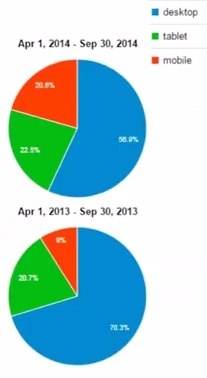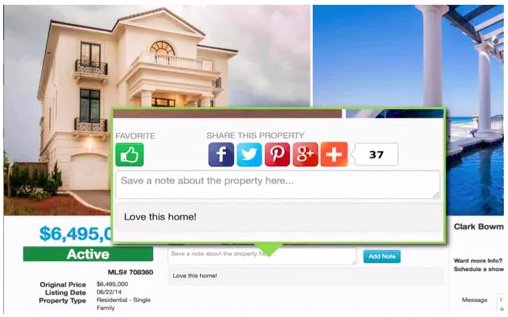You are viewing our site as a Broker, Switch Your View:
Agent | Broker Reset Filters to Default Back to ListVideo: Mobile. Local. Social.
October 28 2014
On Tuesday, we sat down for a chat with Florida broker Richard Eimers to discuss the experience of the modern home buyer. We talked about consumer search behavior, the value of Internet leads to new agents versus seasoned agents, and the tools and resources that can make the buying process easier.
If you missed our webinar, you can catch up by watching the video recording below. Readers crunched for time can skip to our notes on the next page.
Mobile.
 Do you know where are your prospects coming from? Richard Eimers knows where his come from--and that, increasingly, is from mobile devices like smartphones and tablets. Eimers shared the graph at right with us during the webinar. It's a screenshot from his website analytics that shows mobile activity on his website increased from 30% in 2013 to 43% in 2014.
Do you know where are your prospects coming from? Richard Eimers knows where his come from--and that, increasingly, is from mobile devices like smartphones and tablets. Eimers shared the graph at right with us during the webinar. It's a screenshot from his website analytics that shows mobile activity on his website increased from 30% in 2013 to 43% in 2014.
Eimers suspects part of the reason is the increased portability of tablets and the new, larger screens of smartphones that makes searching more comfortable. Regardless of the reason, the data underlines how important it is that your website be mobile-friendly.
Eimers uses a Virtual Office Website (VOW) solution called Quantum Leads to meet this need. With it, he can cater to the needs of mobile users while monitoring--and better understanding--their search behavior.
Local.
One of the key differences between VOW solutions and IDX solutions is the ability of VOWs to offer pending and sold property data in addition to active listings. According to Eimers, this is what consumers want and it's how his business differentiates itself from competitors and even portals.
"The question of what's for sale is only good when you, as a buyer prospect, are beginning your search," says Eimers. "As you get more and more serious, you start to really want to know, what are these properties really selling for?"
Eimers thinks that the extra data that portals provide--despite their inaccuracy--is what draws in consumers over and over again. Where portals fall down is providing accurate and timely local information. "You can reach out to [consumers] and say, 'Look, we're a local website, our data comes from the local MLS so you're not only getting active properties as they come to the market, but you're finding out about the properties that went pending.' It's really incumbent upon the agent to explain to the prospects why it's important for them to know which properties went pending."
Users of Eimers' website have often found more value in pending and sold listings than active ones. "You can see how many times a seller has expired their listing, how many times it's had price adjustments. You can see a lot of the things about those properties that are active on the market and give you a better sense as a buyer. So the buyers when they come in to our office are really quite astute. They know just so much more about the market and we don't have to look at as many properties. We don't write low-ball offers because, like in CARFAX, you know where the weaknesses are in the sale of the property. So I think it's been delivering the full experience on a local scale that's 100% accurate. I think that's where the appreciation for our websites are."
Social.
Two of the top three most-visited websites are social networks. To capitalize on this visitor behavior, Quantum Leads' Virtual Office Websites all have social sharing features built-in.

"We've made it a part of the prospect's experience. It's one of the things that you talk to them about," says Eimers. "One of the things you remind them of is that you're going to be buying this property and this is property that you're going to be proud of and you might want to start showing your friends and your family the properties that you're looking at. Let's find out what they think about it. It drives all these additional people back to the website."
So what social networks does Eimers prefer? The local market in Destin, Florida is largely a second home market. This influences his choice of networks. "People that can afford a second home tend to be more professional or entrepreneurial in nature. So I find that I connect better in LinkedIn," he says. "I see many agents and a lot of conversation taking place with how you can be more effective with Facebook. ... It's becoming far more professional, as far as being able to present yourself as being a competent, knowledgeable Realtor. I think Twitter's too fast. It comes and it goes so quickly that I don't think we're able to capture enough people. It's a constant experience."
Next Steps
- Visit the Quantum Leads website to learn more
- For an overview of Quantum's Virtual Office Websites, see our Product Review
- Explore more VOW solutions in our Product Directory
- Sign-up for our next webinar, "Convert Leads and Close Sales for Less"









